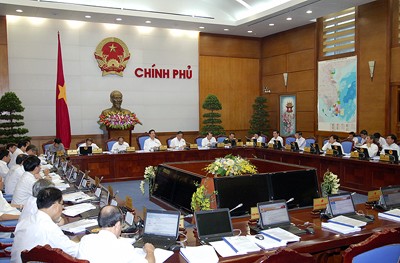(VOVworld) – The Vietnamese government considers inflation control and macro-economic stabilization key tasks for the immediate future. This was announced at a regular monthly government meeting on Thursday in Hanoi.
The Consumer Price Index jumped by 2.2% in September, the fastest rise so far this year. The National Financial Supervisory Committee attributed the price hike to higher costs of education, health care, pharmaceuticals, oil and gas and transportation. Health care services increased 23.8%, the highest rise in the commodity bracket. Minster of Health Nguyen Thi Kim Tien says the poor will not be affected as most of the costs are covered by health insurance: “The government has bought health insurance for the poor. A recent government decision stipulated that patients who undergo heart surgery or kidney replacement and cancer patients are supported by health insurance. So are ethnic minority people, children under 6 and individuals who have rendered great services to the nation. People near the poverty line are subsidized for 30% of their insurance and we are proposing to support 100% to individuals who have recently escaped poverty. Farmers and students receive from 30% to 50%.”
 |
Economists say the increase in the Consumer Price Index in September is seasonal and is not affected by macro-economic policies, but is psychologically disturbing. The government reiterated its determination to keep inflation in single digits. Prime Minister Nguyen Tan Dung said: “We will closely control prices and do our best to prevent inflation from rising to double digits. This is important for macro-economic stabilization this year and in the years to come. Except for things beyond our control, we should not make any mistakes in inflation control.”
The government urges more credit growth, tightened total payment tools, stabilized exchange rates and controlled interest rates. Efforts will be made to keep overspending at 4.8%. The government also asks for the balance of goods demand and supply, especially food.
To achieve a GDP growth rate of more than 5%, the government orders ministries and agencies to continue removing obstacles for businesses, accelerate production and exports of goods such as rice, seafood, garments and textiles and leather footwear. Attention should be paid to tourism, finance, banking, telecommunications and aviation services, while solving the problem of inventory backlogs, especially construction materials and real estate.
Economic restructuring will be accelerated this year, including restructuring public investment, state-owned enterprises and the banking system. With regard to restructuring state-owned enterprises, priority will be given to restructure of groups and corporations. Restructure of banks will focus on settling bad debts and dealing with banks with poor performance. The government is also urging greater efforts to generate jobs, reduce poverty, provide loans to students and ensure social welfare.